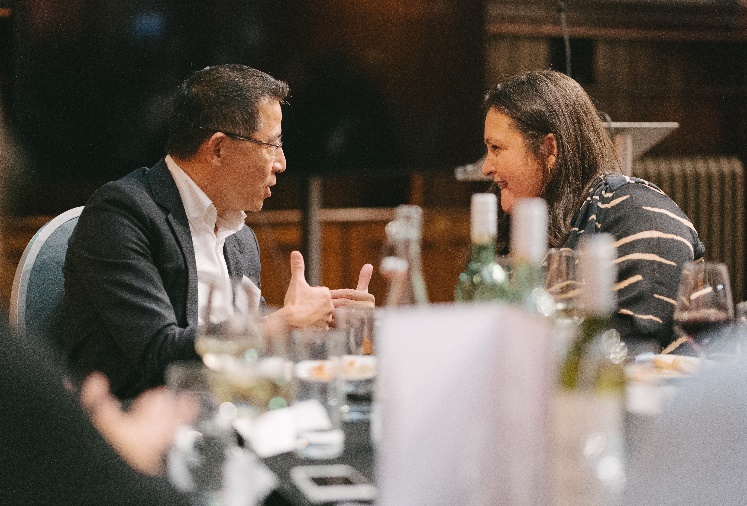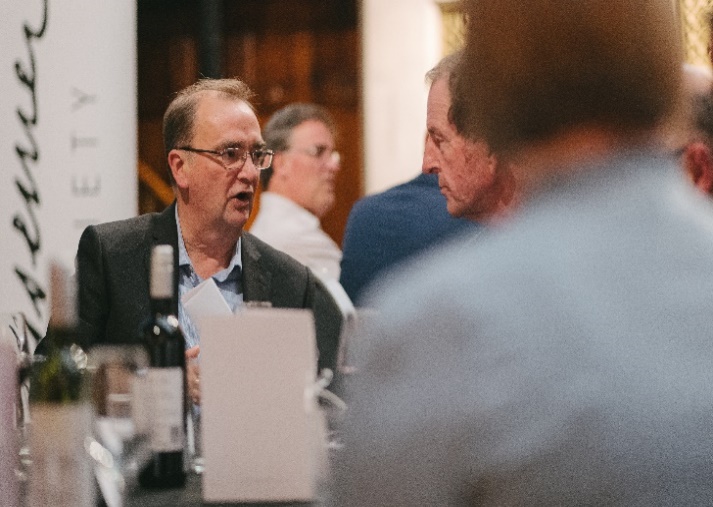SEP 22ND 2022
THE COMMON ROOM, NEWCASTLE ON TYNE
The Venue
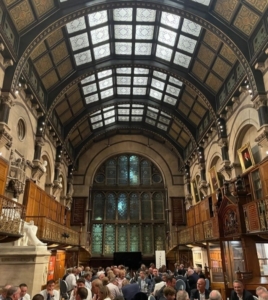 The Common Room describes itself as a celebration of Graft and Glory. This reflects the fact it was once the home of the former Mining Institute which played a leading role in the Industrial Revolution. Its aim is to continue building on that legacy promoting technologies that enable sustainability. It was therefore entirely appropriate for a Bessemer Dinner.
The Common Room describes itself as a celebration of Graft and Glory. This reflects the fact it was once the home of the former Mining Institute which played a leading role in the Industrial Revolution. Its aim is to continue building on that legacy promoting technologies that enable sustainability. It was therefore entirely appropriate for a Bessemer Dinner.
The Institute was founded in 1852 on the present site, shortly before Henry Bessemer announced his disruptive steel invention, arguably at the peak of the Industrial Revolution. How many meetings it must have hosted since. Ours I felt was in a worthy tradition therefore as partaking in the current New Industrial Revolution.
AIM OF THE EVENING
The aim was to bring together investors and innovators with the supporting eco system on a discovery to find out what is happening in the North East and around the UK in the electric drive train industry, stretching from power electronics, motors and control drives to batteries, which together account for up two-thirds of the value of an Electric Vehicle.
The call of the evening was to recognise that, despite the exciting new technology pouring out from start ups and SMEs in the UK, if the UK is going to succeed it needs to scale up rapidly across these key electrification verticals. This means it needs the follow-through support of private investment and the OEM value chains to drive it.
KEYNOTE DINNER SPEAKERS
- FELIX ZHANG – Group Executive Director and Co-Owner of Envision Energy
- DR SAI SHIVAREDDY – Co-Founder and CEO of Nyobolt Ltd
- MATT BOYLE – Chairman of the North East Automotive Alliance
PRE-DINNER FORMAT
The pre-dinner session was divided into three sections: the first for the agencies which help innovation companies with funding and other kinds of support, followed by Success Stories and then an Investor Panel. Each had 3-minutes to transmit their key points that might generate follow up interest, and showcase the expertise and experience on hand.
INDUSTRY SUPPORT AGENCIES
FARADAY BATTERY CHALLENGE: represented by Jacqui Murray who has been deputy director since the launch of Faraday in 2017. The Fund has been a tremendous stimulant to grow a highly entrepreneurial battery eco-system, that has attracted investment from financial and corporate sources respectively.
DRIVING THE ELECTRIC REVOLUTION: represented by Deputy Director, Venn Chesterton, is having a significant impact on how the Power Electronics, Motors and Drives sectors interact and build supply chains.
ADVANCED PROPULSION CENTRE: represented by Josh Denne, who heads up SME Programmes, and works closely with the Technology Developer Accelerator Programme (TDAP) consortia to accelerate the development of technologies that can be applied into the automotive sector.
CENTRE FOR PROCESS INNOVATION (CPI): represented by Graeme Cruickshank, Chief Technology & Innovation Officer. The CPI also has Catapult status. It is based close to Newcastle and provides prototyping and open access facilities for a range of companies involved in manufacturing and process technologies, including batteries.
LECTURE THEATRE
One of the reasons to look forward to the dinner and the pre-dinner presentations was the use of the Lecture Theatre, a veritable a time capsule. Built in 1901, it was modelled on the famous lecture theatre at the Royal Institution, but at 1/8th the size meaning it can hold 100 people instead of 800, and therefore perfect for our group of nearly 75.
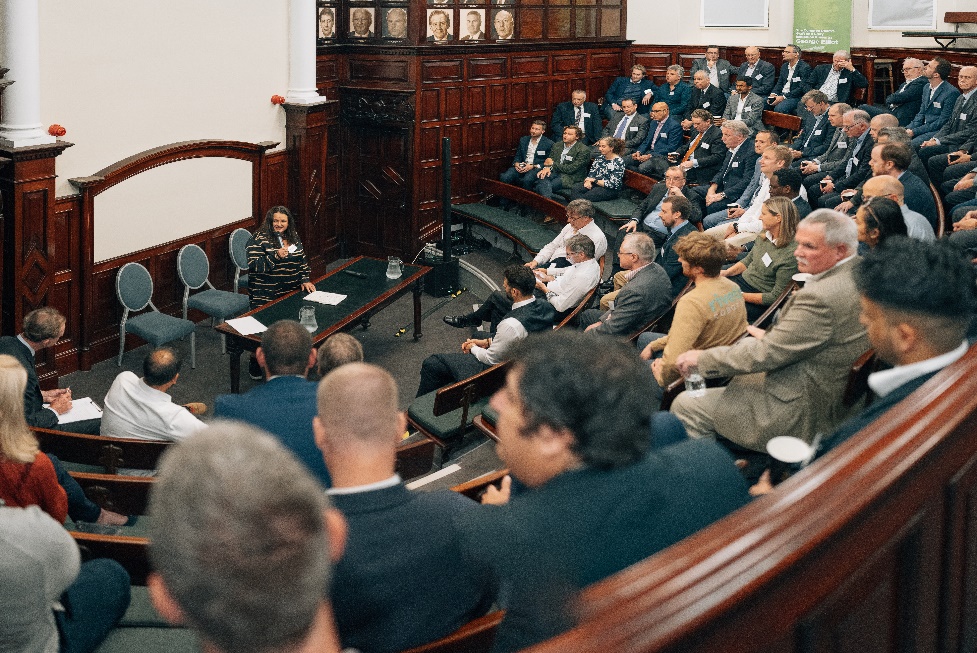
A pitch in the Lion’s Den underway: Dragons from Left, Mark White (UK Innovations Science Seed Funds); Simon Robeson (NorthEast Capital) and Alex Buchan (North Star Ventures)
SUCCESS SHOWCASES
This section gave the floor to companies showing strong progress to remind investors and the audience how much progress (success) is possible.
TEVVA LTD – DAVID ROBERTS, Exec Chairman
Tevva has raised over $200m giving it a valuation higher than the better-known [?] Arrival at $0.9B. Its Tilbury facility is now producing EV trucks for commercial sales, namely a 7.5 tonne BEV truck and 7.5 tonne BEV with Hydrogen fuel cell range extender. In pre-production is a 19.5 tonne BEV with Hydrogen fuel cell range extender. The headcount is 500 and rising. It will roll out duplicate facilities in the USA and Middle East in 2023.
ECHION TECHNOLOGY LTD – ALEX GROOMBRIDGE, Co-Founder and CTO
Echion Technologies develops and supplies high-performance active materials for Li-ion batteries that enable long-life and high-power for industrial applications. It has signed a supply agreement for up to 150 tonnes of its “XNO®” materials with Morrow Batteries. It is also a winner of a Challenge Competition to electrify mining operations, supported by some of the world’s largest mining giants.
TURBO POWER SYSTEMS LTD – NIGEL JAKEMAN, Engineering and Biz Development Director
TPS have completed development of a new electric vehicle charging system that addresses grid capacity constraints which are acting as a commercial barrier to widespread electrification of vehicle fleets. In addition, the new approach can facilitate lower charging electricity costs and faster time to realisation. It is now installing the first commercial system in Gateshead, expected to go live in 2-3 months, and will be looking for partners and investors to roll out nationally and globally from 2023.
EQUIPMAKE LTD – IAN FOLEY, Founder and Managing Director
Equipmake has been developing electric vehicle technologies for over 10 years and is now at the point of transitioning to production. It has a vertically integrated structure covering electric motors, inverters, battery packs, and vehicle control systems. After the surge in demand for electrification solutions in the last three years it is at the point where it is working through a £10M order book and a £400M pipeline. This led them to seek significantly larger investment via a successful IPO in July this year.
FARADION LTD – CHRIS WRIGHT, Co-Founder and Chairman
Faradion Ltd was acquired by the Reliance Group of India in December 2021. The new parent company has announced the construction of a multi-GWh battery plant to manufacture sodium-ion cells in India. Faradion`s role will be to continue to develop all aspects of the technology from raw materials to cells to packs. To this end a major increase in sodium-ion investment, in both additional staff and equipment, is now taking place in the UK.
CLAS-SIC LTD – RAE HYNDMAN, Co-Founder and Managing Director
Clas-SiC is an open, pure play, 6” SiC wafer foundry delivering a fast route to market for fabless designers of SiC devices achieved through the process design kits it has developed based on reliability and proven process modules. As SiC devices are an enabler in the drive for Net Zero and the worldwide green agenda, demand for Clas-SiC’s offering is increasing exponentially and the major challenge for the company is to fund increased capacity fast enough to meet this growing demand.
INVESTOR SHOWCASES
Six companies were selected to showcase in front of three “friendly dragons”. They were each given three minutes to explain their attraction. The session was conducted under the skilful chairmanship of Bessemer Founding Council member, Steve Bennington.
AVOCET BATTERY MATERIALS LTD – Kieren Hall, CEO, Co-Founder
Avocet is a demerger from an established steel-making business, created to localise the supply chain of key components and materials for the lithium-ion cell manufacturing market. It has established a method to make cell tabs that help overcome the common cause of failure and leakages in pouch cells. It now operates the first high-speed production line outside of Asia and is developing non-Chromium based surface treatments for use in tabs that enhance corrosion resistance and therefore will improve the reliability of pouch cells. It is part of two APC funded projects: ULTRA to develop AMTE Power’s tabs for their UHP cell, and CHARGE which focuses on scale up of ABM’s technology.
SIGMA LITHIUM LTD – Daniel Kaute, Senior Adviser, Board Member
Sigma Lithium has developed metallic lithium anodes for Li-ion batteries. Metallic lithium offers about 10 times more energy than standard graphite electrodes. However, metallic lithium anodes are known to grow dendrites, which are a safety hazard, to avoid which the current density has to be kept low, meaning low charge and discharge rates, or low power. Sigma Lithium has developed a 3D lithium anode which increases the surface area by a large factor and thereby reduces current density for safety purposes, while increasing overall power, because the surface area is so much larger. The process is designed to manufacture, is cost competitive, and already is proven to work.
AERISTECH LTD – Duncan Kier, Founder, CEO
Aeristech is developing compressors for hydrogen fuel cell applications and refrigerant compressors for battery thermal management in battery electric vehicles. It has some of the largest Tier 1 suppliers as customers, including Cummins, Gentherm and GKN Aerospace. It has also won a number of UK government grant projects to develop compressors for hydrogen fuel cell power in commercial vehicles and aviation. The investments it is making now are focused on growing a sizable market position in the rapidly growing early stage hydrogen fuel cell market.
ANAPHITE LTD – Joe Stephenson, CEO
Anaphite has a proprietary process for incorporating graphene into materials – Graphene Self Assembly. It is able to make better cathodes for lithium-ion batteries, improving performance, cost and quality. It has just completed a successful Faraday project that has demonstrated the potential of the technology, and a £4.1m funding round. It is now at the point of developing and scaling the process, working with prospective customers and supply chain partners.
LONDON ACTIVE MAGNETICS LTD – Tim Regan, CEO, Co-Founder
London Active Magnetics has developed technology that will greatly simplify power control and delivery in Electric Vehicles. It will end range anxiety through direct 3 phase AC charging and enable ‘filling station’ battery swapping. It is in the process of building partnerships in the UK battery and vehicle sectors to bring an integrated EV power solution to a worldwide market.
WEARDALE LITHIUM LTD: Stewart Dickson, CEO and Co-Founder
There are currently no UK or European sources of lithium in production. The company proposes to extract lithium from underground geothermal brines having secured exclusive access to two boreholes in Eastgate, Weardale, which were developed by a consortium led by the University of Newcastle who identified high levels of lithium. All the enabling infrastructure is in place and the mine is close to the UK’s EV battery and automotive manufacturers in the North East.
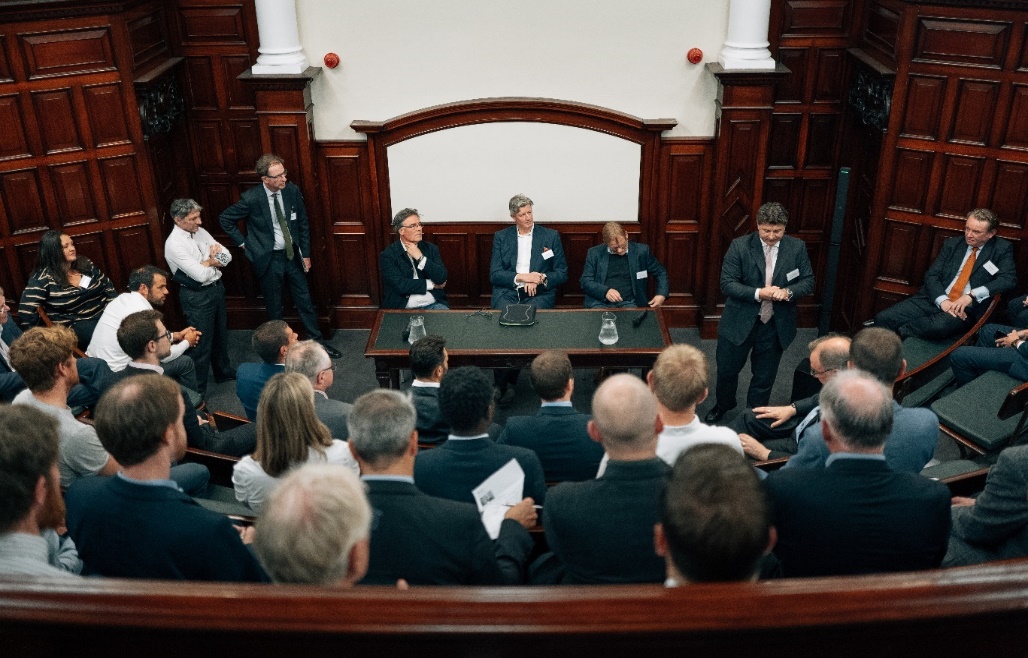
A pitch in the Lion’s Den underway: Dragons from Left, Mark White (UK Innovations Science Seed Funds); Simon Robeson (NorthEast Capital) and Alex Buchan (North Star Ventures)
NETWORKING RECEPTION
In the aptly named Stephenson Room.
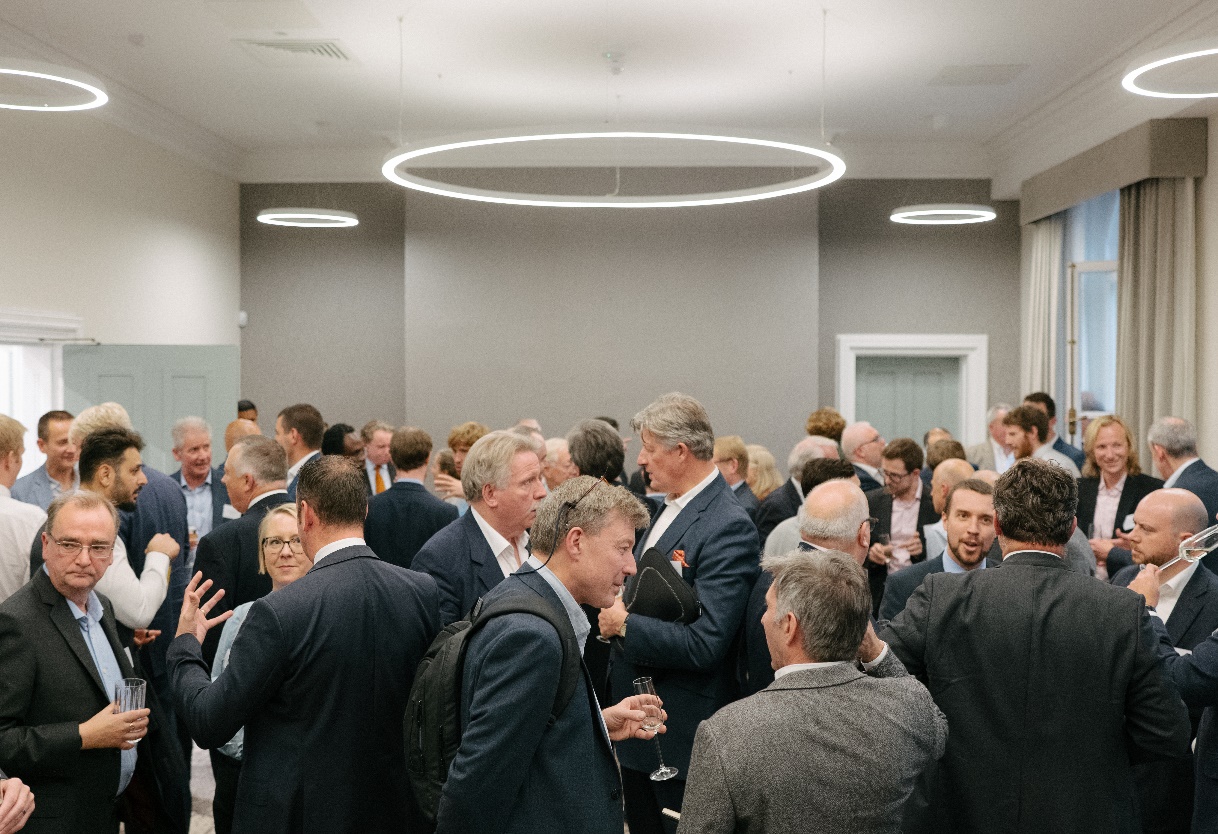
Is there a halo over this event?
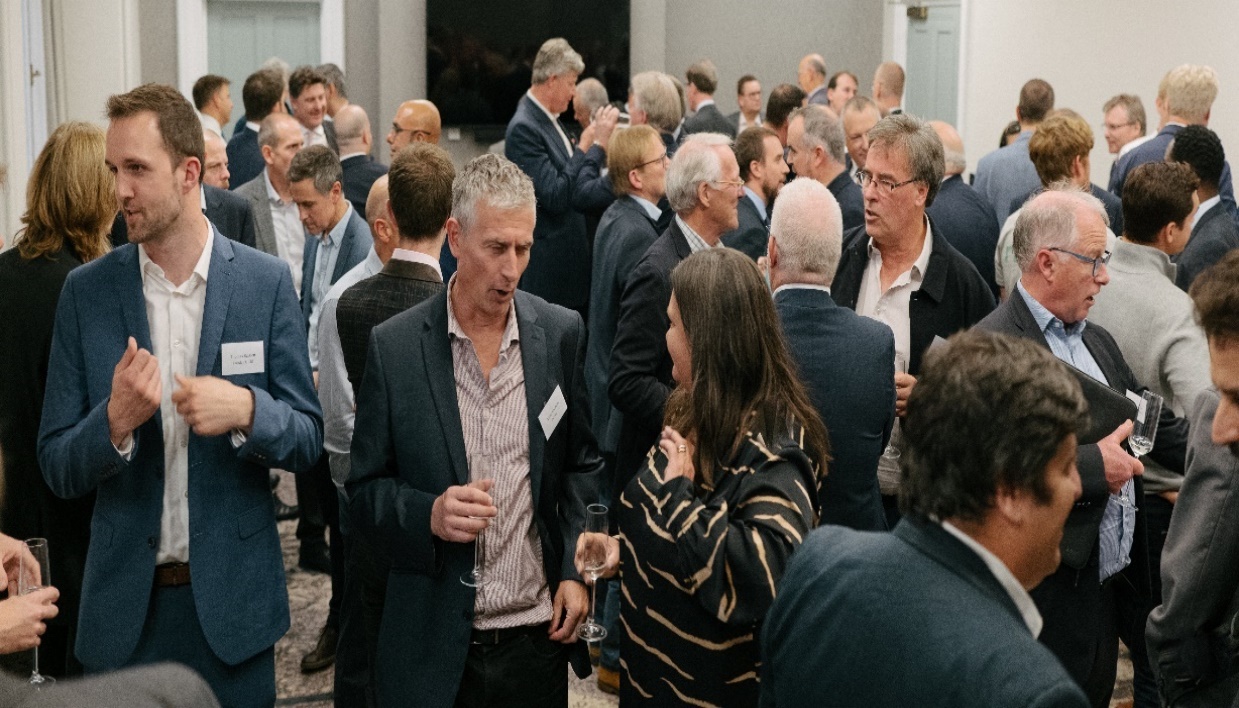
The long and the short of it is this
DINNER FIGURES
The co-organiser and the keynote speakers photographed in front of the obscured Bessemer banner.
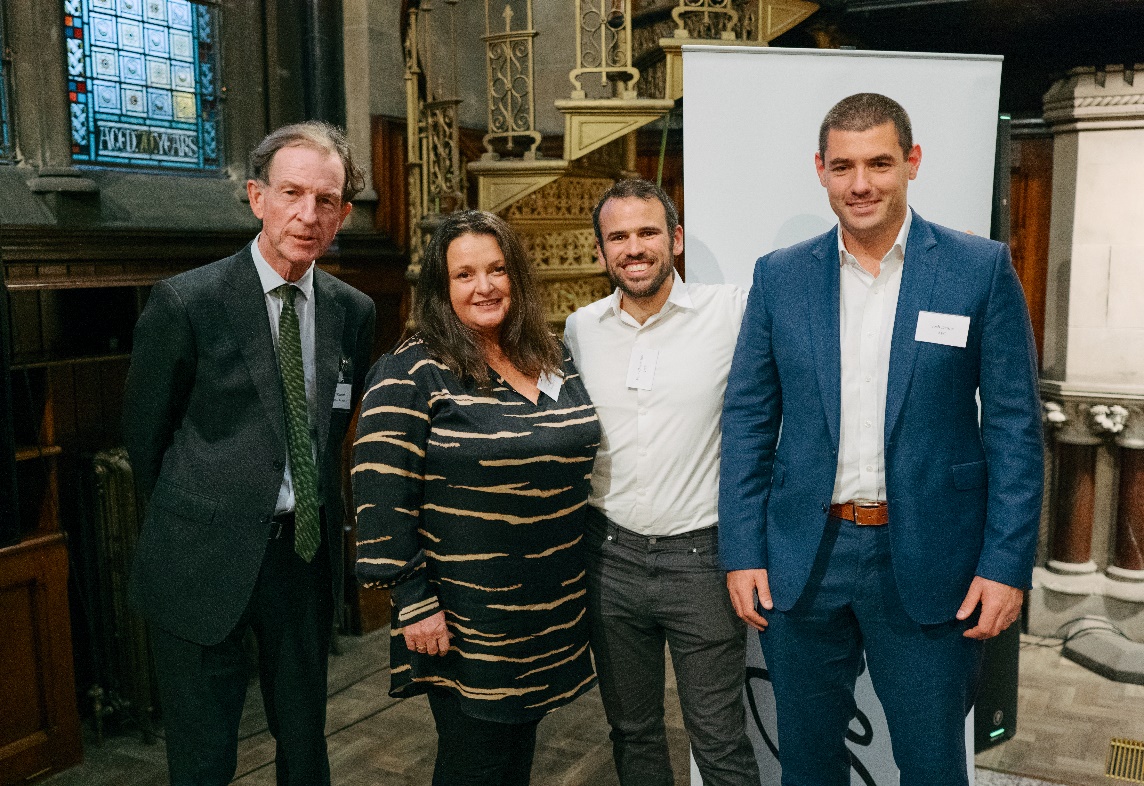
Co-organisers line up with Alex Stewart of Bessemer: Jacqui Murray (Faraday ISCF); Venn Chesterton (DER) and Josh Denne, APC
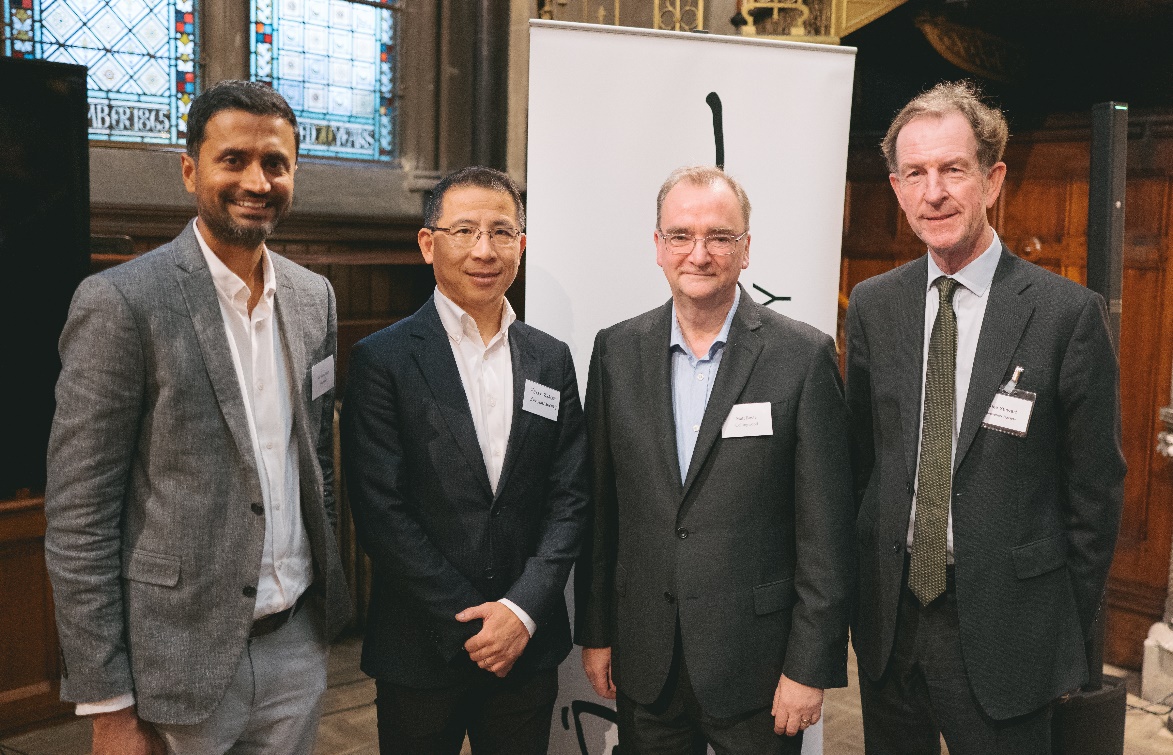
Keynote speakers from left: Sai Shivareddy, Felix Zhang and Matt Boyle
DINNER IS SERVED
The spectacular Wood Hall provided a perfect setting for a meeting of industry entrepreneurs involved in advanced manufacturing, recalling the many leaders of manufacturing industries over the years who have met here since the Hall was built in 1853, the very time Henry Bessemer introduced his world-changing steel making invention.
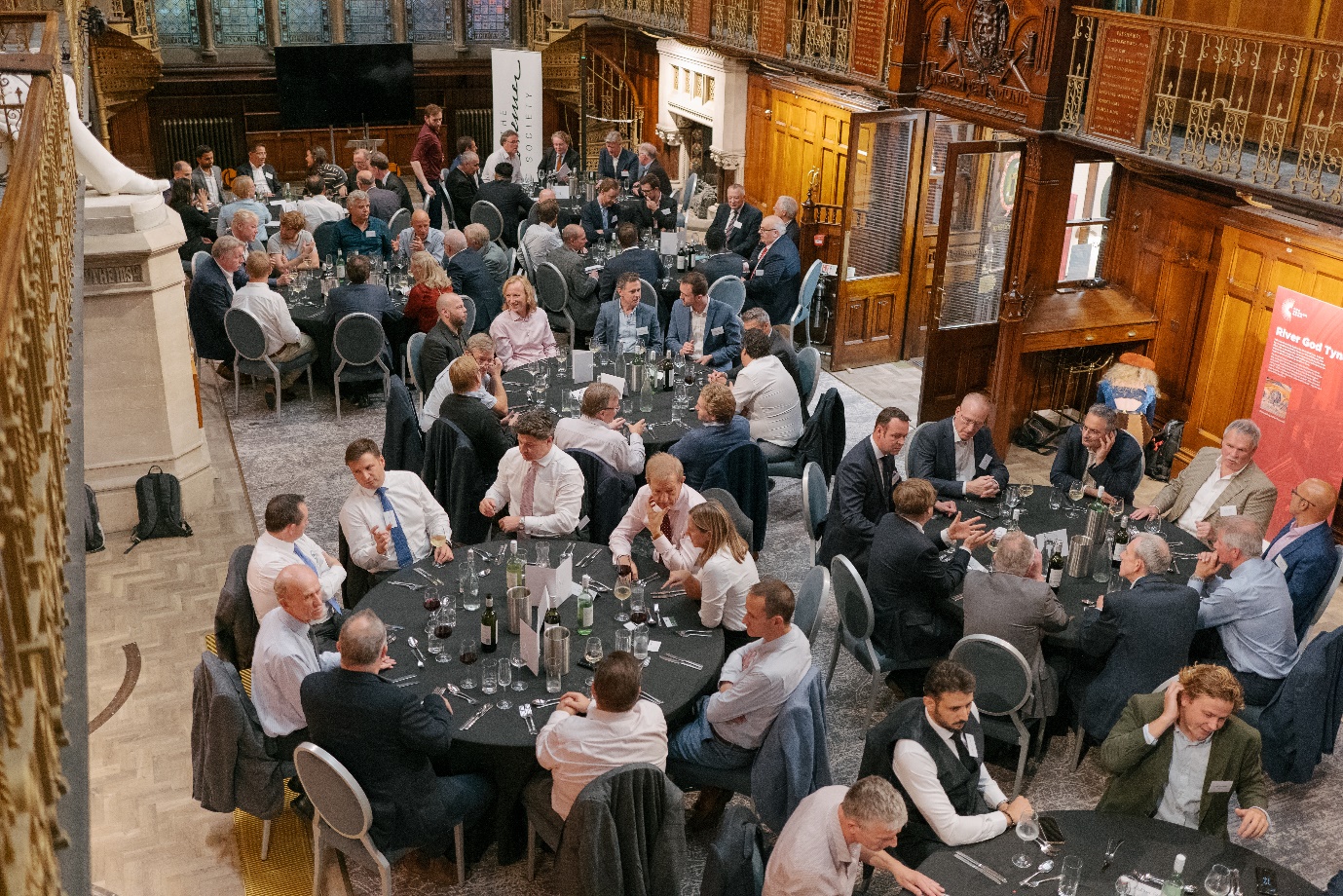
A full house
- Frank Zheng and Jacqui Murray on Top Table
- Matt Boyle, Top Table
KEYNOTE SPEAKERS
The aim of the talks was to progress the journey from a North East perspective about the automotive industry, to an example of a dynamic, entrepreneurial success story, and then hear a global perspective by a leading global investor.
MATT BOYLE, North East Automotive Alliance
Matt is a perfect person to represent both the North East and the wider automotive topic, having been the former managing director of a very successful power control manufacturing company in the North East, Sevcon Ltd, later acquired by Borg Warner. He then worked with UKRI to establish what became the Driving the Electric Revolution Challenge (DER), initially named the Stephenson Challenge (which I think he preferred). He is now the Chair of the North East Automotive Alliance, https://northeastautomotivealliance.com/# and a trustee of The Common Room, so we were firmly in his patch.
In spite of the difficulties caused by Covid, the disruptions caused by Brexit, and the massive challenge to transition to carbon-less fuels, Matt was upbeat. “Never has been this a more rewarding time to be in the industry”, he said. “I wish I was 10 years younger.” He pointed out how much supply chain has grown in the past few years from such small beginnings. He noted that the fundamental underpinning for this – easily forgotten – are advanced power semiconductors, so it was appropriate that Clas-SiC Ltd in Scotland was a presenter before the dinner. To secure investment for scale up, however, Matt agrees with a point that David Roberts of Tevva made in his presentation that you have to go to the USA for the real money. In the case of Clas-SiC, for example, all its investment has come from a Californian entrepreneur.
What makes the sector so exciting is that the opportunity in electrification is very broad. Echion Technology in their presentation mentioned mining as an example of a high value, niche market. These niches are easier to operate in because the automotive market sets very high barriers to entry by demanding high quality at a challenging price point. This requires high levels of productivity to achieve, implying high-capacity capital assets and ability to operate on a global scale. Still, there are ways to provide a competitive product by adding software to improve customer satisfaction and brand loyalty.
One of the biggest challenges is upskilling and recruiting people – “quantum and quality”. It will take time, but he notes there are many initiatives underway now, including JLR’s plans to re-train large part of its workforce to build electric vehicles. An encouraging trend Matt has noticed is that engineering graduates, who used to choose a career in the City or consulting, are now interested in engineering careers because the salary gap is closing. However, investing in talent and upskilling of the workforce adds to costs. Competition too is a problem, with countries like Germany committing billions of dollars of investment into the industry (but digital skills can be an Achilles heel for them). Even so, the UK has a great legacy as a pioneering (innovative) nation to build on which is why it is the best time to be in the industry now.
SAI SHIVAREDDY, NYOBOLT LTD
Only four years ago I was sitting on a train next to Sai after a Bessemer dinner in London on our way back to Cambridge. He was working at the offshoot of a large Scandinavian mining company which had set up a battery material development office in Cambridge, but it was clear that his thoughts were about doing something bigger, on a Silicon Valley scale, and he expressed some frustration that he couldn’t be in Silicon Valley rather than Cambridge. The talk he gave effectively showed that it is possible to progress a company rapidly in the UK and secure financing, but doing so by using a global network, not least in Silicon Valley.
In July this year Nyobolt raised a £50M B round, only three years after incorporating as a spinout from the research work at the laboratories of Prof Clare Grey at Cambridge University. How did he get there? Sai is someone who believes strongly that engineers have a positive impact on society, recalling a lecturer at the Judge Business School (which he attended as a graduate student from India 15 years ago), who told them that in 19C Britain philosophers and engineers were the ones solving all the problems. At that time, he participated in a challenge set by Sir James Dyson to charge cordless vacuums ultra-fast. It set him on his engineering quest to solve a major problem, “Supercharging the Electric Revolution” as he called it.
It was on a flight to San Fransisco that he encountered the Silicon Valley mindset when he got into conversation with someone from the Valley who showed tremendous interest in Sai’s ideas, and how they could support him in the Valley. This was when in Cambridge the prize money for new ideas from the University was in the region of £15-£25,000. He learnt that in Silicon Valley it was the story, or narrative that was so important to explain the problem you are solving and its impact. The bigger the problem, the more people are willing to pay for the solution. You have to connect the two.
Academics he realised do not connect the problem with the solution. Indeed, to his shock he found that academia is often a long way behind the state of the art in industry. Some of his research at University he discovered later was old hat when he was discussing his ideas with industry researchers in Japan. The realisation encouraged him to switch his focus from research to manufacturing, where the real challenges lie. Unless the solution can be shown to work in a customer’s hands it isn’t a full solution.
It took him 10 years to figure out a solution. In the first six years he committed everything to working on it. In this context he recommends a book which describes his journey well, called “Build: an Unorthodox Guide to Making Things Worth Making”, by Tony Fadell (’the ‘father of the iPod and iPhone and the creator of Nest’) published in May this year. [A handy tip for Bessemerites!]. The journey involved immersing himself in the industry, learning about the state of the art and how to manufacture which took him to Asia to connect with supply chains.
When he came to the point of raising money he wanted to make sure to involve West Coast investors, and in his first post seed funding round in January 2021 at least half of the approximately $10M raised was from the Bay Area. He also wanted to create the conditions for competition between strategic partners to attract equity in the company and in the B round in July 2022 he raised £50M from HC stark (a strategic supplier of their raw materials, and from their parent Masan group).
None of this was easy however. By mid-2021 it was the height of the SPAC market (bubble) and by the end of the year investors were pulling their term sheets. The first half of this year was the hardest of all. He talked to 100 investors, and had two term sheets by March with a third promised, but then two syndicates pulled out. By now Nyobolt’s headcount had increased from 7 to 40 and it had a two-month cash runway left. He decided to keep going nonetheless “at 70mph”, convinced he was on the right track because the company had a solution the world needed. “There should be 10 companies with Nyobolt’s solution not a couple”. He secured the investment with four weeks to spare.
So, he says, don’t take no for an answer, believe in your vision; and also expect the unexpected he added, with a nod to his hosts in the North East. Here they were looking for a quote to supply them with several million small battery packs. In Shenzhen they were offered $25 a unit, but a company in the North East quoted them half the price from Shenzhen. That for me was a surprise of the evening, and a very pleasant one as we were among other things bigging up the North East.
Readers’ Note: Nyobolt make their own materials which they integrate as part of providing an entire fast charging solution – batteries and electronics + software and chargers where necessary. As a result, Nyobolt is operating in a much larger market, with much more value created, and control of the value chain. However, of course, this needs more capital and resources. This is where vision and not taking no for an answer are so important!
FELIX ZHANG, GROUP EXECUTIVE DIRECTOR, ENVISION ENERGY
If Sai Shivareddy is a good example of the global entrepreneur, Felix Zhang must be from his talk one or two levels even higher… Firstly, he has attended around nine world-leading centres of learning, including in the UK, the London School of Economics and London Business School. He has visited (did I hear right?) about 140 countries… While, one of his most favourite authors is the travel writer, Jan Morris, most of whose books he has read. So, it seems rather than being a classic energy wheeler-dealer, Frank is a philosopher with a penchant for history and allegory – which should make him quite a conversationalist, or raconteur. However, he had the more prosaic task of providing us with a global perspective on the activity of the Envision Energy group, which among other things is the owner of the AESC battery plant in Sunderland.
He began by describing how In Germany they are setting up e-mobility centres. He has been visiting Germany for the last 20 years and he likes to tease them about their engineering mindset as it can come at the expense of a more open, digital mindset, he then reels off a few industries where Germany is behind, implying it may fall behind in e-mobility too.
To illustrate this, he chose a Chinese idiom from the Warring Period about 2600 years ago that warns against slavish imitation. At that time one of the kingdoms was famous for how gracefully its citizens walked. Many from near-by kingdom wanted to copy this, and many travelled there to learn. However, in their effort to learn a different way to walk they lost th ability to walk at all and had to return home crawling on their knees. “You need to be original and find your own way”, said Felix, and he enumerated things like a global mindset, gaining insights from looking at things differently, and being ambitious.
Envision has a suitably clear statement of who it is and what it wants to be: one, to build a sustainable future for the world; two, to address two big challenges: the reduction of the cost of renewable energy and the improvement of digital solutions in order to increase efficiency to 100%, or close the loop; thirdly, to supply its three main products – wind power, digital solutions, and batteries.
Wind power was their first product and they are the number three worldwide and number one in several markets, though not entered the UK market yet. For their digital solutions business, headquartered in Singapore, they recently raised a $500M fund. Their digital solutions are deployed to improve the efficiency of various assets to make them smarter, including wind power systems, electric vehicles, airports, harbours, and so on. In batteries, they are leveraging a global supply chain to establish plants around the world. They are expanding their plant in Sunderland; investing in Northern Europe with Renault; and they have a 30 GWh plant planned for Spain. In addition, they have signed major supply contracts with the likes of BMW this year and Mercedes-Benz last year, and they have similar plans for the USA.
Their scale and speed of investment is highly impressive and truly illustrates the scale of the challenge and the response, fuelled by a far-seeing vision, sense of challenge, and ambition. Frank explained it in terms of how it took 250 years to build the current energy system, and how there are only the next few decades to replace it. This is a $100 trillion shift, which could produce giant companies in the process, but will require that everyone works together. Food for thought.
Q&A DISCUSSION
An informative discussion ensued in the remaining 20 minutes before breaking out to the bar and networking.
A Bessemer member initiated it by pointing out that Government policy to date has focussed on the supply chain – power electronics, batteries etc – but does not give support for manufacturers of vehicles. The meteoric rise of Tesla (and hopefully Tevva and Hyzon he added) has shown that there are opportunities for new entrants, and that the final manufacture is where the jobs, expertise and value are created. All the UK volume manufacturers are foreign-owned so the UK has little choice but to go along with decisions made in Japan, Germany, France and the USA. Or to be more succinct, he asked, who are we creating the supply chain for?
Another member pointed out that there is nothing unprecedented about the issues we face in the UK car industry if we consider the 1970s when the industry had energy power cuts on a regular basis, 3-day working weeks, regular industrial action, double-digit inflation and high interest rates! It is however at a crossroads, and unless there is a strong strategic direction set by Government for EV hybrids and BEVs, there is a danger of squandering a major opportunity which could put at risk the ability of UK automotive to be a significant world leader in higher performance and niche vehicles.
The APC offered a view on where the UK stood globally, noting that it was ahead of Europe and global trends in terms of the development and adoption of electrification and hydrogen technologies across the automotive sector. One reason is the importance placed on cross-sector supply chain development and enablement, such as working with the aerospace body, ATI, around use of carbon fibre materials for hydrogen storage tanks. This supply chain flexibility will boost UK’s position for global innovation investment.
However, anchoring innovation in the UK, he added, requires a three-pillar approach: technology R&D is a main part of it, but it will require foreign inward investment to realise this, which is why a holistic approach to leverage supply chain development as well as skills and workforce development are the other two pillars of innovation success.
Faraday added that the UK was in advance of other countries in committing to go electric by 2035 and that UK based car manufacturers were targeting 2030 to make the transition, placing them ahead of other automotive nations. This view was also supported by the North East Automotive Alliance which is seeing the supply chain respond strongly.
However, another member pointed out that while the UK market has much to show it is very small as a base to build global solutions. Moreover, after Brexit there was the loss of commercial global agreements, such as the extra duties imposed on sales of batteries from the UK to USA which were 0% under the EU’s agreement with the USA.
Finally, Simon Robeson, the Managing Partner of NorthEast Capital, was asked to comment on the difficulties for companies in the North East to raise scale-up capital given they are further from London. Firstly, he said, investors in the South East have “a 24hr conveyor belt of opportunity” which deflects their interest, while if they invest out of the region their overheads are higher. His solution is to create regional sources of scale-up capital, as NorthEast Capital is doing by raising a regional scale-up fund to address the opportunity working with world-class technology companies in the North so that they are in strong shape to attract funding from London’s financial community.
Alex Stewart
Founder and Convenor
October 5th, 2022




